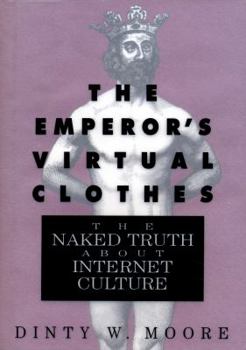The Emperor's Virtual Clothes: The Naked Truth about Internet Culture
A skeptic by nature, a writer and teacher more at home with ballpoint pens than computer programs, Dinty W. Moore wanted to find out for himself if the much-touted Internet and the electronic culture it has spawned is really going to be the Next Big Thing, or whether it's the emperor's new clothes. This is not a how-to guide, a giddy net-head's online magical mystery tour, or a binaries-in-the-sky futurist treatise. Instead, this book tells it like it is about the Internet. Anyone who's asked, Who's there? What am I missing? and What is it all about? will find Moore's good-natured skepticism a welcome break from the explosion of wide-eyed techno-hype raging all around us. "Moore is far and away the best pure writer of the 'Wired School.' He's like the Stage Manager poking his head in around the set of 'Our Town.' Funny that it took the arrival of this commonsensical outsider to finally put a real human face on the digital world."--San Jose Mercury-News.
Format:Hardcover
Language:English
ISBN:1565120965
ISBN13:9781565120969
Release Date:January 1995
Publisher:Algonquin Books of Chapel Hill
Length:280 Pages
Weight:0.66 lbs.
Dimensions:0.9" x 5.2" x 7.3"
Customer Reviews
4 ratings
Definitely not a time waster
Published by Thriftbooks.com User , 24 years ago
I enjoyed going back to 1994 and reading about the advent of some of our now routine virtual lives. Mr. Moore has a delightful way of telling a story, whether about Usenet (heavy in this book) or electronic mail, or the new thing called the World Wide Web. I think this is an excellent quick trip through "where we've been" and I highly recommend it to anyone who takes the internet seriously or as a career. I wrote to Mr. Moore shortly after I read the book to see if he was planning a follow-up tome. He said he was not, but if he does, I'll be in line to buy it shortly after publication. History with a sense of humor.
Intelligent look at Internet Community
Published by Thriftbooks.com User , 25 years ago
The author captured an intelligent snapshot of internet culture and community as it began to take hold in the mid to late 1990s. A fun, easy read.
Chinese Edition
Published by Thriftbooks.com User , 26 years ago
From Dr. Liu Huajie Preface for Hebei University Publishing House Edition Even faster than predicted, the Internet is growing. In the United States, an estimated 60 million people are now using the Internet to shop, to socialize, to work, and to do research. This is nearly double the number of people who were using the Internet four years ago. But the Internet is no longer simply a United States phenomenon. Equally amazing and exciting is the rapid growth of the Internet across the globe, from Europe to Africa to Asia. Four years ago it seemed everyone on the Internet was speaking English - now it is becoming a true world community. I am especially excited to see China beginning to establish an Internet presence. I think the future of China and of China's relationship to the United States will be made better by this new technology, if people use it well.It will be interesting, however, to see if Asian countries face some of the same prob! ! lems and confusions that Americans have faced. While my understanding is that Chinese users rely on the Internet and e-mail more for research and business than for fun and friendship, I suspect that social and entertainment uses will become more common. This book is very much about the 'social' and 'human' side of Internet use - how conversations by e-mail differ from conversations when two people are in the same room, how making 'virtual' friends on the internet is different than becoming friends with someone you meet on the street. Is a community of friends who only meet through the computer a true community? Will our computer friends become more important to us than the people who live nearby to us in our towns and villages? As more people in China access the Internet, more of them will explore these same questions. Americans have been both excited by the Internet and the wealth of knowledge and information that is available, and frightened by the rapid change! ! . Many people worry that there is too much information on ! the Internet, more than anyone could ever use, some of it unreliable or dangerous. Some worry too that the use of e-mail and electronic discussion is breaking down the common bonds that unite people, that electronic friendships are not as strong as face-to-face relationships. Some worry that too much time spent in front of the computer and not enough time out in nature is bad for the human spirit. I am sure users in China will have some of these same questions too. I teach university classes in the United States, and when I ask young American students what excites them the most about the Internet, they often say "talking to people my age in other countries." Wouldn't it be interesting if American students and Chinese students were in regular daily conversations, not just about world events, but about music and sports?Some have predicted that the Internet is way to world peace. I suspect this view is an exaggeration, but I do hope that the increased e! ! ase of communicati
well-written, humorous Internet primer
Published by Thriftbooks.com User , 29 years ago
From Library Journal: Moore mischeviously lays bare some revered 'net features such as MUSHS, digital relationships, and e-mail, and, in a hilarious encounter he poses as a female and attempts to have cybersex. Still Moore has some good things to say about virtual communities. This (is a) well-written, humorous primer.





